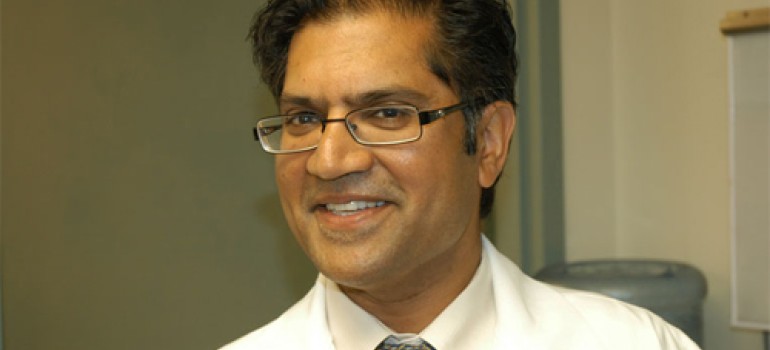
Dr. Manohar Bance makes impressive gains in diagnosing and treating hearing problems
“I have always been a team builder,” says Dr. Manohar Bance. “Brainstorming, developing ideas and bringing people together to discuss them, is an enjoyable and natural impulse for me.”
The surgeon and researcher, who also teaches at Dalhousie Medical School, serves as Otolaryngology-Head and Neck Surgery division head at the QEII Health Sciences Centre and is a member of a variety of national and international committees, is the director of the Ear and Auditory Research (EAR) and Sensory Encoding and Neural Sensory Engineering (SENSE) research labs at Dalhousie.
Between these roles, he heads up and collaborates with a team of nearly 60 people, including ENT surgeons, gene therapists, biomedical engineers, lab technologists, residents, fellows and administrators.
“We are a team of equals,” he says. “There may be a person who is first among equals, but we are all marching in the same direction.”
In fact, Dr. Bance and his team are advancing steadily in the direction of developing revolutionary tools and techniques for diagnosing and treating hearing problems. One recent development, with doctors Brown and Adamson from biomedical engineering, is a mini ultrasound endoscope, a device small enough to fit into the ear canal and provide a picture of the middle and inner ear. Previously, accessing the middle ear would have required surgery; the inner ear was inaccessible.
Having multiple labs allows Dr. Bance and his colleagues to take an idea from concept through prototyping to testing, and eventually to market.
“It’s very satisfying to be able to develop these ideas from the ground up,” says Dr. Bance, although the process can be lengthy. “The regulatory environment is slow – it takes time to get ethics approvals, secure funding and ensure patient safety.”
The key to maintaining momentum is keeping the end goal in sight: This is about helping patients.
"I want to understand mechanisms: how and why things work. And there are lots of people like me. The success that we have had comes from reaching out to people who also want to know why. We come together under an impulse to understand, and then we ask how we can dig deeper.”
